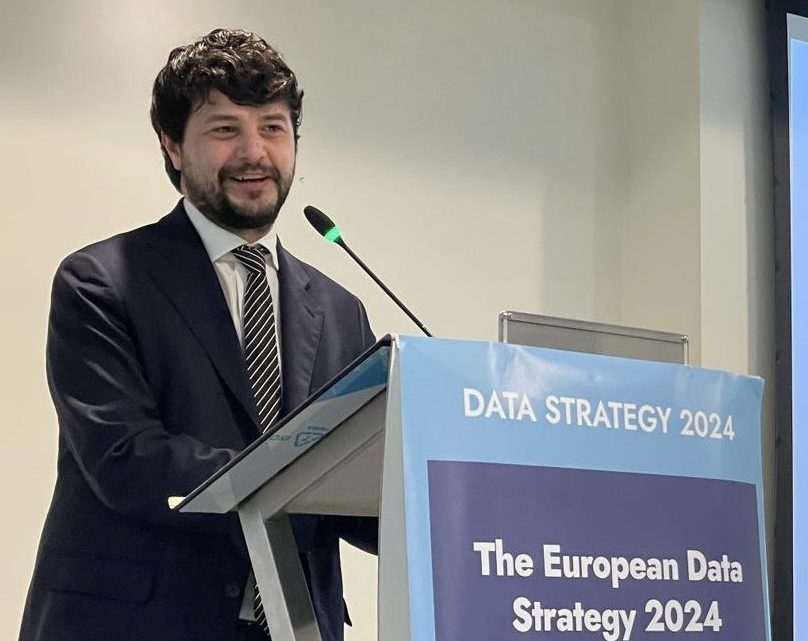On the 13th of February, Re-Imagine Europa, along with SoBigData Research Infrastructure, the Consiglio Nazionale delle Ricerche and the Institute of Information Science and Technologies Pisa, organised the event “Empowering Enterprises through BigData and AI – The European Data Strategy 2024”.
The event was well timed, given the European Parliament’s Internal Market and Civil Liberties Committees were holding a vote on the AI Act that day. The event gathered industry leaders, innovators, and policymakers to explore the cutting-edge advancements, challenges, and opportunities of Big Data and AI in Europe. Because of the pivotal role that European public research plays in steering the digital transition and applied AI landscape, creating the space for well-informed discussions is crucial. Doing so allows for a better understanding of the technologies that drive economic resilience, technological leadership, and social progress.
The day began with Brando Benifei, Italian MEP and rapporteur of the AI Act, reiterating the significance of Big Data and AI in Europe’s future. Minutes from departing to cast his vote on the AI Act in the European Parliament, Mr. Benifei emphasised the importance of big data on the EU’s ability to remain competitive. A similar sentiment was echoed by Stefano Verrecchia, Deputy Permanent Representative and Ambassador to Coreper I at the Permanent Representation of Italy to the European Union, who shed light on the position of the Italian government. Believing that such new technologies present a great opportunity rather than a risk, Mr. Verrecchia nevertheless argued that democratic governance within AI must be promoted.
Malgorzata Nikowska, Head of Unit at Digital Transformation of Industries, DG CONNECT, took the stage, outlining the importance of developing Europeans’ basic digital skills, as well as their ability to use more advanced technologies. Interestingly, she spoke about how the prevalence of publicly available data in Europe sets it apart from other global powers in terms of technological innovation. This contributes to the potential creation of a ‘single data market’ in Europe by 2025, one that enables its citizens to reduce their energy dependency and become more efficient with resources. Whether or not the ambitious goals set by 2025 will be reached remains to be seen. Nonetheless, the abundance of publicly available data, is a vital tool in Europe’s journey there.
Ludger Odenthal recognised the wealth of opportunities that big data and AI can offer to Small and Medium-sized Enterprises (SMEs), and the importance of supporting them throughout their digitalisation process. This assistance should arrive in 3 ways, he noted. First, initiatives such as the Digitalisation Hub are invaluable to provide advice and encouragement to SMEs. Sharing a view held by Ms. Nikowska, Mr. Odenthal also underlined the need to develop digital skills in Europe. Without them, we risk becoming uncompetitive. Lastly, he raised the interesting point that the digitalisation of business should go hand in hand with the digitalisation of administration.
Bolstering a theme that was quickly becoming dominant, Veronique Willems, secretary general of SMEunited, highlighted the enormous challenge faced by the lack of digital of skills across European SMEs. Not only digital skills, but also basic ones, such as reading, writing, and calculating, all necessary to build digital skills upon, and all currently in decline. Supplying digital training to entrepreneurs and facilitating cooperation between SMEs to counteract the decreasing level of basic skills, and to improve their digital expertise is crucial in their success during the digital transition. Furthermore, legal barriers and cybersecurity threats may be preventing SMEs from making full use of the resources available for digitalisation. Lastly, she cited a lack of infrastructure as a cause for concern. The necessity of remote work during the Covid-19 pandemic was a catalyst for the digitalisation of many businesses, however, there has since been “a plateau in progress” that needs to be overcome.
Lastly, the Italian National Research Council’s Luca Pappalardo analysed the environment in which technology giants flourish, and how this can be recreated to aid European SMEs to do the same. He pointed out that the success of multinational corporations such as Facebook is due in part to the availability of public research. He then posited a thought-provoking question, how we can create the necessary fertile ground for similarly groundbreaking ideas in Europe? One possible answer, he suggested, lies in available research infrastructure. Research infrastructure can help to overcome roadblocks to innovation, such as a lack of expertise or labs. There is much RI across Europe, all with common principles to access them. Proposal is evaluated based on merit and eligibility, and if accepted, they are invaluable in granting access to infrastructure. SoBigData is composed of over 30 universities, helping people to navigate the explosion of big data, technical, human and computational resources.
Following the illuminating presentations given by the individual speakers, a panel of experts discussed the future of AI and data. This included: Full Professor Fosca Giannotti from Scuola Normale Superiore di Pisa, Dr Luca Pappalardo from National Research Council of Italy, and Roberto Trasarti, who is SoBigData’s Project Coordinator and a Senior Researcher at Consiglio Nazionale delle Ricerche. They also analysed where the biggest challenges and opportunities of these technologies lie, and how fears and concerns regarding their implementations can be addressed. With the opportunity of the audience to pose questions, a common thread throughout the discussion was the trade-off between legislation that regulates big data and AI, and the stunting effect legislation can have on innovation in the field. In the afternoon, some of the participants headed into different workshops, to further discuss the impact and use of Big Data for industry and the Healthcare sector.




